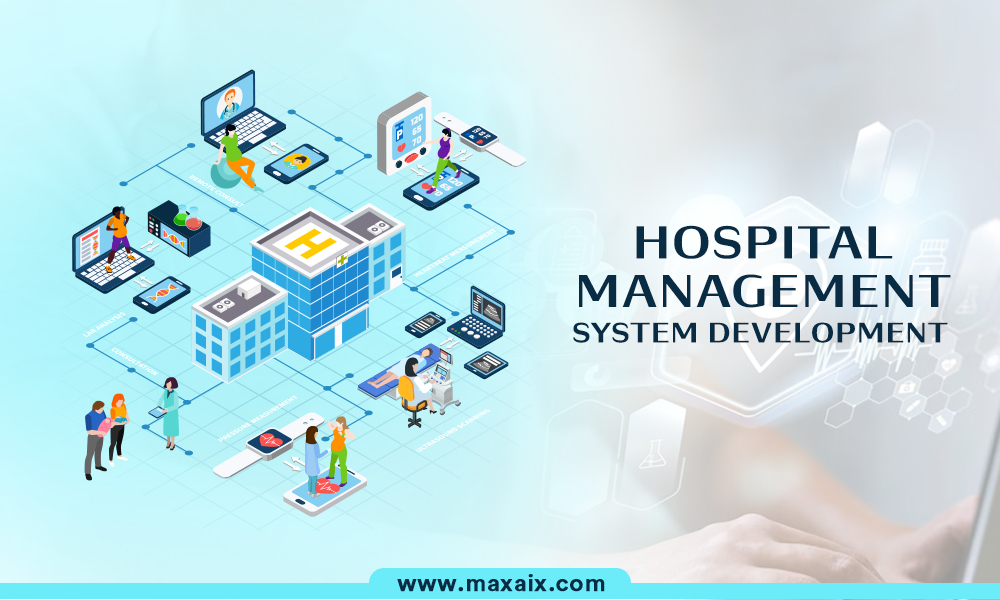Hospital Management System: Features, Benefits, and More

Effective hospital operations management is critical to providing excellent patient care and maximizing resource efficiency in the ever-evolving field of healthcare. Within healthcare facilities, HMS (hospital management system) plays a key role in streamlining clinical, administrative, and financial processes. This comprehensive manual will examine the characteristics, benefits, features, functions, and evolution of healthcare administration systems.
What is a Hospital Management System?
Healthcare facilities use an integrated software system, called a hospital management system (HMS), to automate and manage a variety of administrative, clinical, and financial operations. It integrates several features into a single platform, including electronic health records (EHR), billing, appointment scheduling, patient registration, and inventory management. Healthcare providers may increase patient care, assure regulatory compliance, and improve operational efficiency with the help of HMS.
How Does a Hospital Management System Benefit Hospitals?
There are several advantages for hospitals and healthcare organizations when a hospital management system is implemented.
- Streamlined Workflow: Reduces manual paperwork, streamlines administrative procedures, and increases overall workflow effectiveness.
- Better Patient Care: Facilitates easy communication between medical professionals, improves the accessibility of patient data, and guarantees timely intervention.
- Improves resource allocation, cuts down on waste, and boosts resource use among departments: this is known as optimized resource utilization.
- Robust Data Security: Uses strict access restrictions and encryption techniques to ensure the security, confidentiality, and integrity of patient data.
- Regulatory Compliance: Helps hospitals adhere to laws like the General Data Protection Regulation (GDPR) and the Health Insurance Portability and Accountability Act (HIPAA).
- Data Analysis and Reporting: Provides extensive analytics and reporting features to monitor key performance indicators (KPIs), spot trends, and help you make wise decisions.
- Cost Efficiency: Lowers administrative costs, does away with paper-based procedures, and lowers mistakes, all of which help hospitals save money.
Features of a Hospital Management System
Important components of a hospital administration system include:
- Patient registration: Gathers and maintains insurance information, medical history, and demographic data about the patient.
- Organizes patient appointments, keeps track of doctors’ availability, and sends out appointment reminders.
- Digital patient health information, including diagnosis, prescriptions, test results, and treatment plans, are called electronic health records, or EHRs.
- Billing and Invoicing: Produces invoices, handles payments, oversees insurance policies, and records monetary exchanges.
- Inventory management: Keeps an eye on stock levels, controls inventory, and speeds up acquiring medical equipment and supplies.
- Doctor and Staff Management: Keeps track of the schedules and credentials of physicians, nurses, and other staff employees.
- Laboratory management includes overseeing the processing of samples, keeping tabs on test findings, and storing them digitally.
- Analytics and Reporting: Create individualized reports, examine data patterns, and keep an eye on performance indicators for hospitals.
8 Essential Hospital Management System Modules
The following fundamental components are usually included in a hospital management system:
- The Patient Management Module is responsible for overseeing patient registration, scheduling, billing, and medical records.
- The doctor management module keeps track of patient-doctor interactions, appointments, and doctor profiles.
- Billing and Invoicing Module: Manages insurance claims, payment processing, invoicing, and billing.
- Prescriptions, dispensing, and medicine inventories are all managed via the pharmacy management module.
- Lab Management Module: Maintains records of tests, sample preparation, and test outcomes.
- The Inventory Management Module oversees the purchase procedures, equipment, and medical supplies.
- The Appointment Scheduling Module makes it easier to make, modify, and remember appointments.
- The module for reporting and analytics creates reports, examines data patterns, and keeps track of performance indicators for hospitals.
The Role of HMS in the Healthcare Sector
The following are some ways that hospital management systems are changing the way healthcare is delivered:
- Increasing Operational Efficiency: Improving workflow efficiency, cutting down on human error, and streamlining administrative procedures.
- Enhancing patient data accessibility, facilitating smooth communication between healthcare practitioners, and guaranteeing prompt treatment are all ways to improve patient care.
- Providing thorough reporting and analytics tools to monitor key performance indicators, spot patterns, and arrive at well-informed conclusions is one way to enable data-driven decision-making.
- Ensuring Regulatory Compliance: By providing strong security and privacy controls, we help hospitals comply with regulations like HIPAA and GDPR.
Roles of the User in the Hospital Management System
A hospital management system’s user might be:
- Administrators: Take charge of user administration, access controls, and system setup.
- Physicians and nurses may enter medical notes, make appointments, and access patient data.
- Employees working at the front desk: oversee patient registration, appointment scheduling, and billing.
- Pharmacists oversee the distribution, prescriptions, and inventory of medications.
- Lab technicians are responsible for monitoring test findings, sample processing, and lab testing.
- The finance department oversees financial transactions, insurance claims, billing, and invoicing.
Technologies Used in Hospital Management Systems
Technologies such as the following are commonly used in the development of hospital management systems:
- Languages for Programming: The most popular languages for HMS development are Java, Python, PHP, and.NET.
- Library and Frameworks: Developers employ frameworks like Laravel, Spring Boot, and Django for quick application development.
- Popular options for storing and managing healthcare data are database management systems like MySQL, PostgreSQL, and MongoDB.
- Technologies for Web Development: Developers utilize HTML, CSS, JavaScript, and AngularJS to create web-based HMS applications.
- Platforms for Mobile Development: To create mobile HMS apps, developers utilize the Android and iOS platforms.
- Cloud Services: Data storage, hosting, and scalability are all accomplished through cloud platforms like AWS, Azure, and Google Cloud.
Hospital Management Software Development with Maxaix
Our specialty at Maxaix is developing Hospital Management Systems, and we deliver tailored solutions to address the particular requirements of healthcare providers. Our skilled development team creates scalable, safe, and intuitive HMS apps by utilizing industry best practices and state-of-the-art technology. Maxaix is your go-to partner for Hospital Management System development, whether you’re wanting to create a mobile application, web-based HMS, or incorporate cutting-edge capabilities like AI & ML.
How Maxaix Helped Hospitals Improve Reporting and Lead Management
With cutting-edge HMS solutions, Maxaix has a track record of assisting hospitals in enhancing reporting and lead management. With sophisticated reporting and analytics tools, we enable healthcare facilities to monitor important performance metrics, spot patterns, and make informed decisions. Our lead management systems increase patient engagement, optimize marketing tactics, and expedite the patient acquisition process—all of which contribute to the expansion and prosperity of businesses.
Conclusion
To sum up, hospital management systems are essential for raising operational effectiveness, boosting patient care, and guaranteeing legal compliance in medical institutions. HMS solutions offer data-driven decision-making, smooth communication, and administrative process optimization by utilizing cutting-edge technology and feature-rich capabilities. Hospitals and healthcare organizations must invest in a complete hospital management system to survive in the cutthroat environment of today’s healthcare industry.
Frequently Asked Questions
What are the key features of a Hospital Management System?
Electronic health records (EHR), appointment scheduling, patient registration, inventory management, billing and invoicing, reporting, and analytics are some of the important aspects.
How does the Hospital Management System benefit hospitals?
HMS maintains regulatory compliance, optimizes resource utilization, boosts care for patients, increases operational efficiency, and supports data-driven decision-making.
What technologies are used in Hospital Management System development?
Database management systems such as MySQL and PostgreSQL, frameworks such as Django and Laravel, web development tools such as HTML, CSS, and JavaScript, and mobile development platforms such as Android and iOS are all technologies. We also include programming languages such as Java, Python, PHP, and .NET.
How much does a Hospital Management System cost?
Features, technology stack, customization needs, development schedule, and vendor choice all affect the final cost. The cost of a personalized HMS solution might vary from a few thousand to hundreds of thousands of dollars.
What role does Maxaix play in Hospital Management System development?
Maxaix is an industry leader in HMS development, providing hospitals and healthcare providers with specialized solutions, cutting-edge functionality, and industry knowledge.
How does Maxaix help hospitals improve reporting and lead management?
Hospitals may measure performance indicators, spot trends, improve marketing tactics, and boost patient engagement with the help of Maxaix’s cutting-edge features, lead management systems, and extensive reporting and analytics capabilities.
Is HMS development suitable for all healthcare organizations?
Yes, via boosting patient care, increasing efficiency, and facilitating data-driven decision-making, HMS development may help healthcare businesses of all sizes, including clinics, hospitals, and nursing homes.


